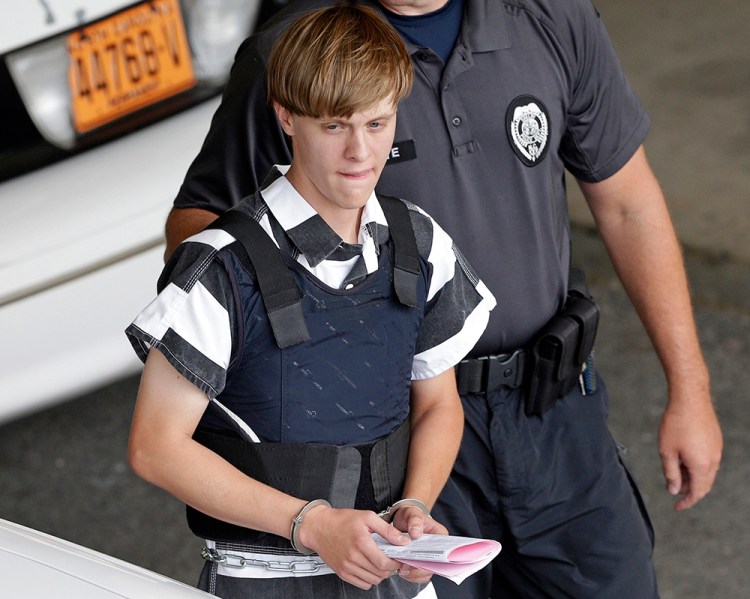CHARLESTON, S.C. — Convicted Charleston church shooter Dylann Roof spoke to the jury for the first time at his death penalty trial Wednesday, telling them there’s nothing wrong with him psychologically and that he is not trying to keep any secrets from them.
But perhaps most important is what he didn’t say: He didn’t ask jurors to spare him from the death penalty. The jury last month unanimously found Roof guilty of hate crimes and other charges in the shooting deaths of nine black church members during Bible study. The jurors will now decide whether he should be sentenced to life in prison or death.
“My opening statement is going to seem a little bit out of place,” the softspoken 22-year-old white man said calmly as he stood in front of a podium, occasionally glancing at notes. “I am not going to lie to you. … Other than the fact that I trust people that I shouldn’t and the fact that I’m probably better at constantly embarrassing myself than anyone who’s ever existed, there’s nothing wrong with me psychologically.”
Roof’s attorneys have indicated that he chose to represent himself during the sentencing phase of his trial because he was worried they might present embarrassing evidence about himself or his family. As early as last summer, they said they had planned to introduce evidence that Roof suffers from mental illness. Since then, many motions have been filed under seal, purportedly to conceal sensitive information, but it’s likely more details on what lawyers wanted to present.
It’s clear, from his own writings, Roof doesn’t believe in psychology. In a journal read in court during his trial, Roof called the specialty “a Jewish invention” that “does nothing but invent diseases and tell people they have problems when they don’t.”
Prosecutors said Roof deserves the death penalty because he painstakingly chose to target vulnerable people during Bible study at Emanuel AME Church in June 2015. Roof sat with the church members for about 45 minutes and waited until their eyes were closed before opening fire. He told Polly Sheppard, one of the three survivors, that he wanted to leave her alive to tell the world why he attacked a historic African-American church. He said “you’re raping our women and taking over the nation.”
Assistant U.S. Attorney Nathan Williams said the “horrific acts justify the death penalty.”
“He killed nine people. … He killed them because of the color of their skin. He killed them because they were less than people,” Williams said.
Prosecutors plan to call up to 38 people related to the slain and the survivors. Williams told jurors they would hear extensive testimony about the nine victims, including pastor and state Sen. Clementa Pinckney, a “prodigy of the ministry” who was a man of faith, service and family dedication.
“This will be heartbreaking,” Williams said.
The prosecutor also read a portion from a journal found in Roof’s jail cell six weeks after his arrest.
“I remember how I felt when I did these things and how I knew I had to do something and then I realize it was worth it,” Roof wrote, as a handwritten page appeared on screens in the courtroom. “I would like to make it crystal clear. I do not regret what I did. I have not shed a tear for the innocent people I killed.”
As their first witness, prosecutors called Pinckney’s widow, Jennifer Pinckney. During more than two hours on the stand, Pinckney described her husband as an affable figure who garnered respect from all corners in his roles as legislator and preacher but was a goofy family man in private with his two young daughters.
“He always made time for the family, and he always made time for the girls,” said Pinckney, describing her husband’s affinity for cartoonish neckties and socks. “He was the person I think that every mom would be happy that their daughter met and married. … I know that he loved me. And he knew how much that I loved him.”
She described the night of the shootings, saying she and her then-6-year-old daughter were in her husband’s office when gunfire erupted. She locked the doors, shoved her daughter Malana under a desk and put her hand over her mouth.
“She was like, ‘Mama, is daddy going to die?’ And I told her, ‘Malana, be quiet.’ ”
She said she believed she survived the shootings because she was meant to continue her husband’s legacy, part of which involved fighting to get the Confederate flag removed entirely from the South Carolina Statehouse, which happened about a month after the attack.
“Yes the flag came down and so forth, but he just did so much,” she said. “You can’t please everyone. He tried to please as many people as he could.”
Pinckney wasn’t asked whether she thought Roof deserved the death penalty. Some family members of victims have offered forgiveness. Others have said they are undecided.
When it was Roof’s turn to cross-examine Pinckney, he said, “No questions.”
He has said he doesn’t plan on calling any witnesses or introduce any evidence.
Copy the Story LinkSend questions/comments to the editors.



Success. Please wait for the page to reload. If the page does not reload within 5 seconds, please refresh the page.
Enter your email and password to access comments.
Hi, to comment on stories you must . This profile is in addition to your subscription and website login.
Already have a commenting profile? .
Invalid username/password.
Please check your email to confirm and complete your registration.
Only subscribers are eligible to post comments. Please subscribe or login first for digital access. Here’s why.
Use the form below to reset your password. When you've submitted your account email, we will send an email with a reset code.